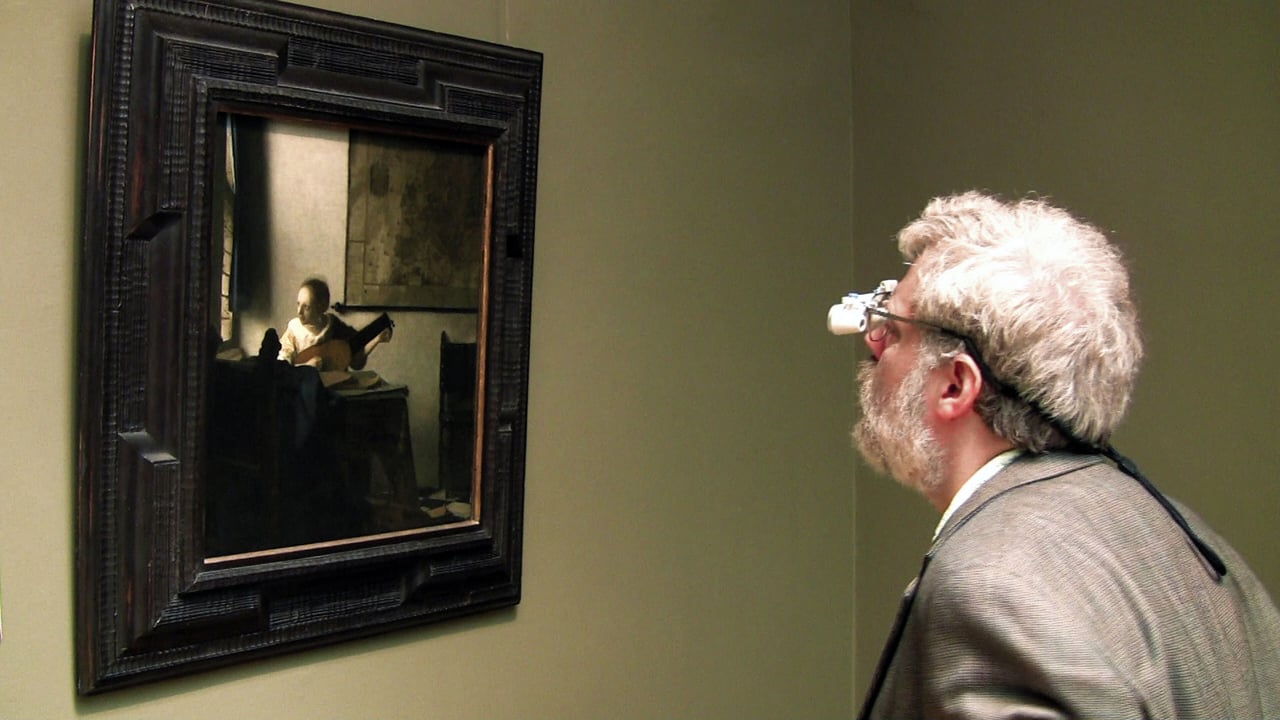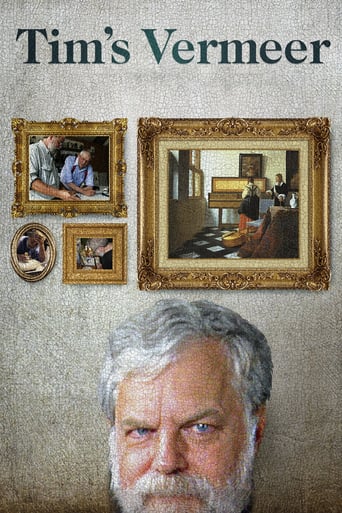



terrible... so disappointed.
Easily the biggest piece of Right wing non sense propaganda I ever saw.
View MoreThe story, direction, characters, and writing/dialogue is akin to taking a tranquilizer shot to the neck, but everything else was so well done.
View MoreAlthough I seem to have had higher expectations than I thought, the movie is super entertaining.
View MoreThis USA comedy/magic duo Penn & Teller's passion project is an intriguing documentary attempts to reappraisal the fine line between an artist and an artisan, through Tim Jenison, a successful American inventor, engineer, but an amateur of painting, who pulls his back into precisely duplicating Dutch Golden Age luminary Johannes Vermeer's masterpiece THE MUSIC ROOM with the help of a simple optic gizmo which he believes Vermeer also secretly utilized, or at least in a similar way in his creation. Vermeer was perversely cagey about his painting technique, there is no extant documents where one can sieve through to find any evidence, the only stratagem is from his oeuvres, mostly depicting domestic interior scenes, as the watchword of the film is "every paint is a document of its own". So Tom's hypothesis, which also bolstered by books such as British artist David Hockney's SECRET KNOWLEDGE and VERMEER'S CAMERA written by British architecture professor Philip Steadman, is bold and contentious, if he successes in producing a Vermeer-calibre painting through his experiment, does it debase Vermeer from a masterful artist who is celebrated for his divine treatment of light and capturing a beguiling verisimilitude of reality, to a mere inventor who laboriously but accurately duplicating real-life image onto the canvas thanks to an ingenious gadget borne out of a scientific discovery? Maybe, the art firmament itself has been longly misjudged as this venerable, superior godsend reflecting human's uttermost self-importance has been proverbially and obstinately holds a dismissive slant towards the progress of modern science, where subjectivity always trumps objectivity. The film is conventionally arranged in a simple and linear narrative centers on Tim's painstaking process, spanning over 5 years, from the exhaustive preparation of the paraphernalia which should be exclusively limited within 17th century's knowledgeability, to the reproduce of the entire tableaux exactly like that in THE MUSIC ROOM, until his four-month-long endeavor to create his own Vermeer, certain longueur is inevitable, since his technique is plainly a one-trick-pony and extremely time-consuming (plus, none too many galvanizing vignettes are included), but Conrad Pope's soothing score always comes timely to diffuse the lurking fatigue. When Tim finally finishes his work, circumscribed by film's inherent attribute, audience doesn't have the access to make the judgement by one's own eyes through the screen, so it is somewhat a bit disappointing, the film doesn't include the appraisal from a more canonical collective of voices apart from Steadman and Hockney, nevertheless, it surely tallies with the fact that Vermeer's output is not as prolific as others, by this method, he could maximally produce 3 pieces a year. Due to the fact that any concrete proof is simply not available, this documentary cannot make Tim's viewpoint indisputable, although, in the eye of an art layman, it is remarkably persuasive, or maybe that is not the whole point at all, after all, it is Tim's strenuous perseverance, questioning inclination, scrutinising method and can-do attitude feels more affecting and encouraging in the end of the story.
View MoreI've watched this film many times because it is in itself a masterpiece. I'm a fan of Vermeer and this film attempts to divulge that it would be nearly impossible for any artist to create the works that Vermeer did without some kind of assistance.One aspect is that Vermeer did not sketch this work beneath the paint; something always found within other works by other renowned artists. As pointed out, microscopic tests suggest that Vermeer painted without having drawn anything on the canvas of this particular work, "Music Lesson".It is captivating to see how a modern day man can mix pigments to make paint as it was made in the 1600's, no less that he could re-create a masterpiece in modern times as exact as well. The attention to details by erecting a room that was so much like the original is simply amazing.This is a must see film for anyone who enjoys art and especially those of the great masters. It does question how great they really were, given that a priceless artwork can indeed be reproduced in what can only be called, "brilliant". However given that we can "copy" such works, they are still appreciated as masterpieces no matter how they were created. Does age alone make such works stunning or valuable? Perhaps yes. Were the artists that great? Perhaps no. Either way, this film is an incredible view from the perspective of the only man who has challenged what we thought we knew. It is up to the observer to decide the truths.
View MoreThis is the first time I write a review in IMDb, and first things first, sorry for my bad English. This documentary -reccomended by a friend who has a degree in Fine Arts- is made, in my point of view, by and with people who doesn't know nothing about art, and in particular, painting. There's no real mystery in the art of Vermeer. The only mystery to me is how much money has this Tim whatever to make his whim reality. For me, this documentary doesn't has anything to do with the art of painting. It's the mere tale of a "savant" with an intelligence of and autistic, so much money in his pockets and a bit of boredom who decides to copy a Vermeer's painting. That's all. The scenes where shows his "technique" and results to their ass-lickers are hilarious and ridiculous. Seeing an extremely senile David Hockney bowing his head in agreement with the stupid theories of "Tim" are embarrassing. And the final "painting" is horrible as well. Is the painting of somebody who's not a painter -he says it-, a picture without soul. I'm an "aficionado" of the history of art and some of the "mysteries" of the documentary are not. For example, that Vermeer didn't leave any traces of retries or sketches in the canvas, so what? All the venetian painters of the XV and XVI had the tradition of painting directly in the canvas, without previous sketches (Tintoretto, Tiziano, Veronés, Giorgione, the Bellini brothers...), and no one has hit the roof about that. Oh, excuse me, there's a recent crappy best seller and a movie with Scarlett Johanson about the life of Vermeer... That explains all. The inhabitants of United States -not Americans, you're not the only people living in this continent- are very peculiar. It seems they see us -the europeans- as martians or something. I don't understand their talent in technical stuff and, opposite of that, their absolute ignorance about the most basic things. In this case the simplest conclusion is this: Vermeer used the camera obscure, just like the most Flemish painters of the XVIIth century. Period. The only detail is that he had more talent than most of the rest. I would like to see if Tim could "copy" the Garden of Delights of El Bosco. I don't think so. You don't become a genius with a couple of lenses and mirrors. By the way, as documentary, is below average. I recommend the "Palette" series by Alain Jaubert.
View MorePenn & Teller are most well-known for their entertaining and often edgy magic act. While Teller's documentary Tim's Vermeer is unrelated to his own work, though Penn and himself are active participants in the project, it does have a type of magic involved. The film follows wealthy inventor Tim Jenison's attempts to re-create a painting by Johannes Vermeer using methods that he theorises that Vermeer most likely used. Jenison is no painter, but he has a mechanical mind. To many, Vermeer represents when art started to become more realistic and three dimensional, almost like a photograph. While some art historians believe that he used optics such as a camera obscura to project an image onto a canvas, others implore that it was from sheer talent. It's a hot debate in the art world and one that Jenison is deeply involved in outside of his primary interests and business in contemporary computers, cameras and television. The film thus studies the relationship between art and technology and how creative expression can be manufactured by machines, though it can be argued that through Jenison's obsessive attempts to re-create a Vermeer he in turn learns the skills in order to do it, rather than prove his theory of being able to re-do it in a clinical objective way. Jenison is a fun figure to watch, he's thoughtful and practical with a sense of humour about his preoccupation. He's kind of like a mix between Dan Harmon and Philip Seymour Hoffman. Sometimes the mission does seem quite frivolous when this time and money could be put into more productive and urgent matters but it does somewhat justify itself. However, while it has all the ingredients for a great doc, Teller's direction just can't keep up. It suffers from choppy editing, a really rough production and a lack of structure. Perhaps a finer editor would have improved it significantly, but Teller's work makes it a much cheaper picture. Still very much worth the watch.7/10
View More